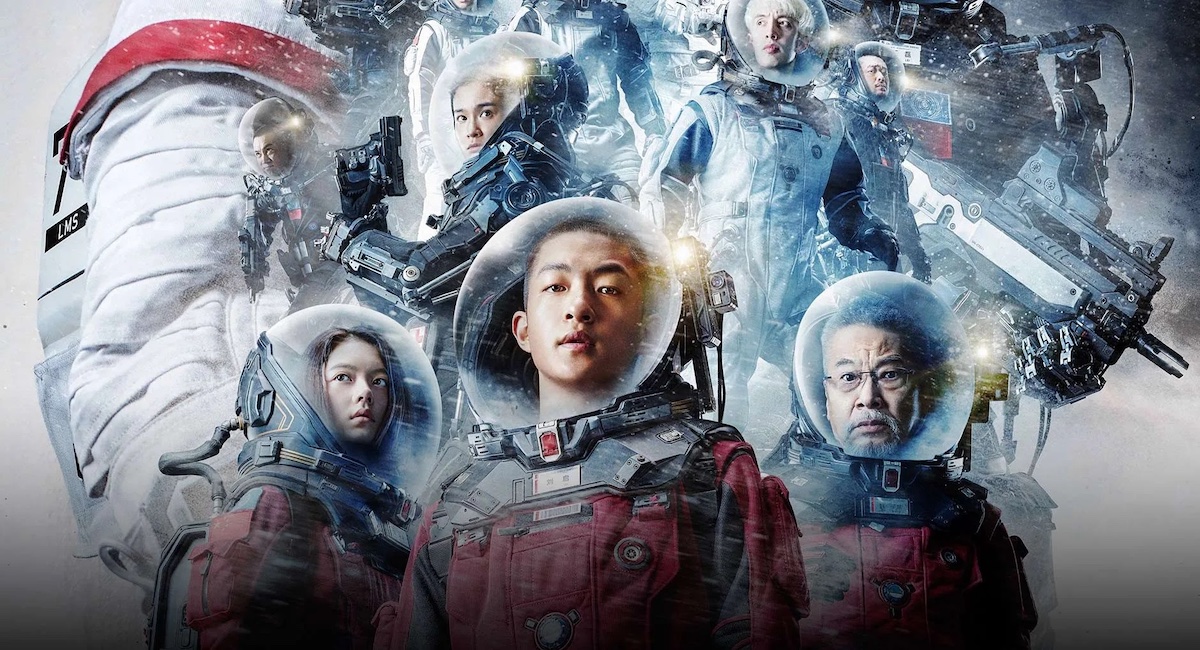(Above: An ad for the Chinese sci-fi blockbuster Wandering Earth.)
At a gathering in New York in early April, Chinese science fiction author Chen Qiufan called the hysteria around artificial intelligence – humanity’s next great hope or its inevitable doom – an overly simplistic reading of the technology’s application.
The job of science fiction, he went on, is to draw a connection between these two poles.
“Science fiction,” he said, “has this cognitive flexibility that allows it to cross many borders, connecting science and the humanities, connecting the future to the past, and human beings with one another.”
Connecting the US and China, though? That may be more difficult.
With tensions rising, Chen admitted that Chinese sci-fi authors who have broken into the international market have to tread carefully. “It’s going to be tough,” he noted, “because everything you say is going to be interpreted through the lens of one country or the other.”
Writers, Chen stressed, will have to survive “in the cracks.”
The wandering balloon
In February, reports emerged of high-altitude balloons floating over US skies. Officials in Washington accused Beijing of espionage, with President Biden eventually ordering what became a highly publicized air strike against one of the balloons then over Alaska.
Online readers in China were quick to poke fun at the incident, dubbing it the “Wandering Balloon,” a reference to the Chinese cinematic blockbuster “The Wandering Earth 2,” which hit theaters in the US in February.
Based on the book of the same name by renowned sci-fi author Liu Cixin, the story deals with a team of astronauts working to push the Earth out of orbit and out of the path of an expanding sun. A hit with Chinese audiences – the film raked in over $70 million on its first day – it was widely panned by critics in the West who described it as thinly veiled Chinese propaganda.
Liu is also the author of the trilogy “Three-Body.” When the first book “The Three-Body Problem” was translated into English in 2014, it won wide acclaim, including praise from Facebook Founder Mark Zuckerberg and former President Barack Obama, who called it “wildly imaginative.” Netflix is set to release a limited series film adaptation of the story later this year.

In China, the novel, about an impending alien invasion, has taken on near-mythic status in some circles, lionized by Chinese tech titans and political hawks alike as a roadmap for Beijing’s vision of a technocratic autocracy uniquely suited to the challenges of our time.
Harvard Historian Niall Ferguson wrote that reading the book had convinced him that the US and China had in fact entered a new Cold War era. “The universe is a dark forest,” Ferguson explained, offering a theory highlighted in Three-Body. “Every civilization is an armed hunter stalking through the trees like a ghost… If he finds other life, there’s only one thing he can do: open fire and eliminate them.”
Open to interpretation
Shunned by officials in Beijing as an example of Western decadence in the 1980s, today China’s sci-fi industry is valued at well over $12 billion and growing.
Recognizing its economic and strategic value, the Chinese government announced in 2021 its National Action Plan for Scientific Literacy, identifying science fiction as a “crucial method” for promoting scientific innovation and culture.
“The future of China’s sci-fi industry will be brighter than ever,” Wu Yan, a sci-fil writer who teaches at the Southern University of Science and Technology, told the China Daily.
While Fergusson and others contend these policy pronouncements say much about the intent of sci-fi works coming out of China, others draw more universal themes.
“The hometown sentiment in The Wandering Earth… makes it feel close,” said Yuan Chenye, an international student studying at New York University who has seen the film twice and watched the prequel three times. The film’s epic scale, he added, made him feel like Chinese cinema was now on equal footing with Hollywood.
Song Mingwei teaches Chinese language and literature at Wellesley College and was among the earliest American academics to promote Chinese science fiction in the US. He says the Three-Body is in essence a deeply human work, about the futility of survival in the face of imminent extinction and the “poetic heart” at the core of that struggle.
Song also admits he is surprised at how well the book has been received by American audiences. “None of us thought it would be this popular,” he said.
Part of that popularity may have to do with timing. The English version of The Three-Body Problem – translated by renowned sci-fi author Ken Liu (no relation to Liu Cixin) of Silk Punk genre fame – appeared just a few short years after the 2008 Beijing Olympics.
“At that time, China’s increasing desire to engage with the world reflected back in American readers increasing interest in China, ” says Michael O’Krent, a Ph.D. candidate in comparative literature at Harvard University who first came across the book as an undergrad.
“I read Ken Liu’s translation of ‘The Three-Body Problem’ when I was studying Chinese literature in college and was instantly hooked, an inspiration that’s never ended,” he said.
Fast forward a decade and the ground is shifting, notes O’Krent, with American readers increasingly shunning Chinese works as overtly propagandistic.
“A lot of Western readers really only want to read the authors who are anti-government or who have been censored in China. They will value work because it’s dissident literature ,” he said. “The other misinterpretation that’s common is that Chinese science fiction is all … about showing China’s muscle.”
The unity of opposites
Chen, who advocates the Taoist principle of the unity of opposites, says in this time of growing division and cascading crises, collaboration and cooperation is key to humanity’s survival. In his novel Waste Tide, translated by Ken Liu, Chen leveled criticism both at the greed of local government in China and at American enterprise for destroying the environment.
“In this era, it’s easy to pick sides. Choosing the middle path to be a connector is the hardest, but also the most valuable effort ,” Chen said in his remarks. “To get rid of the binary opposition of black-or-white to reconcile different perspectives is the only way to see a more comprehensive picture of the world.”
That vision may already be taking root in a new generation of young, mostly female sci-fi authors in China. Song says writers like Tang Fei or Regina Kanyu Wang are gaining increasing recognition for their works, which offer up a distinctly non-binary, anti-chauvinist perspective where the lines separating humans from one another and from other life forms melt away.
“These writers have taken the genre into new, unexplored terrain.”
Speaking at a United Nations event marking Chinese Language Day on April 20, Liu Cixin voiced optimism around humanity’s prospects in the face of what is at times described as the polycrisis – overlapping threats including climate change, and social and economic instability.
“When humanity sees that the only way we can survive is to unite,” Liu said, “I believe the entire human race will still unite.”
This story was originally published in Chinese by the Sing Tao Daily. It was produced as part of a special reporting series exploring the concept of the “polycrisis” and was supported by a grant from the Omega Resilience Awards.





